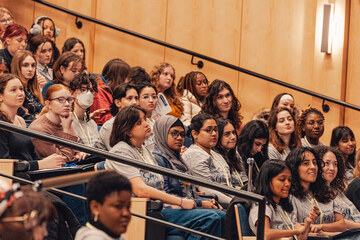Gail A. Hornstein
- Professor Emeritus of Psychology and Education
Gail Hornstein’s PhD studies in Clark University’s innovative psychology department and her Postdoctoral Fellowship in Personality and Social Structure at the University of California, Berkeley shaped the focus of her whole career— understanding how individual psychology shapes and is shaped by the social worlds in which we live.
Her articles, interviews and opinion pieces on a range of topics in personality and social psychology have appeared in many scholarly and popular publications. In recent years, her research has focused on the history and practice of psychology, psychiatry, and psychoanalysis. Hornstein’s biography To Redeem One Person Is to Redeem the World: The Life of Frieda Fromm-Reichmann—called “dazzling and provocative” by Publisher’s Weekly—tells the story of a pioneering psychiatrist who dedicated her life to doing intensive psychotherapy with the most disturbed patients.
“One goal of that book,” Hornstein said, “was to show that despite the spread of medication and electroshock as the primary treatments in American psychiatry, psychotherapy has long had powerful results with even the most seriously distressed people.”
Unlike most scholars who study mental illness, Hornstein has always been as interested in the ideas of those with first-hand experience as in doctors’ theories. Her Bibliography of First-Person Narratives of Madness in English (now in its 5th edition) lists more than 1,000 books by people who have written about madness from their own experience; it is used by researchers, clinicians, educators, and peer groups around the world.
Hornstein’s most recent book, Agnes's Jacket: A Psychologist's Search for the Meanings of Madness, shows how the insights of those diagnosed with schizophrenia, bipolar illness, personality disorder, and paranoia can help us reconceive fundamental assumptions about madness, treatment, and mental life. From Agnes Richter, who stitched an autobiographical text into every inch of the jacket she created in a 19th-century German asylum, to the hundreds of other patients who have managed to get their stories out, Hornstein shows how first-person accounts can help to bridge the gulf between the way medicine explains psychiatric illness and the experiences of those who suffer.
The book also documents the history, operation, and effectiveness of the Hearing Voices Network (HVN), an international collaboration of professionals, people with lived experience, and their families and friends who have been working to develop an alternative approach to coping with voices, visions, and other extreme states that is empowering and useful and does not start from the assumption that such people have a chronic illness. Hornstein speaks widely about HVN and other innovations in mental health across the United States, United Kingdom, and Europe, and she founded—and for six years co-facilitated—one of the first HVN peer-support groups in the U.S., in Holyoke, Massachusetts. She has also trained dozens of facilitators across the United States in this exciting new approach that is helping thousands of people all over the world.
Hornstein’s research has been supported by grants and fellowships from the National Library of Medicine, the American Council of Learned Societies, the National Science Foundation, the National Endowment for the Humanities, the Marion and Jasper Whiting Foundation, and most recently, by a major grant from the Foundation for Excellence in Mental Health Care.
She has been awarded visiting fellowships at the History of Science Department, Harvard University; the Bunting Institute, Radcliffe College; Clare Hall, Cambridge University; Magdalen College, Oxford University; the School of Advanced Study, University of London; the Centre for Research in the Arts, Social Sciences, and Humanities, Cambridge University; the Birkbeck Institute for Social Research, University of London; and the School of Advanced Study, Durham University. In 2011, Hornstein was awarded the Meribeth E. Cameron Faculty Award for Scholarship at Mount Holyoke, and in 2014 she received the Ally Award of the Western Massachusetts Peer Network.
For seven years, Hornstein chaired Mount Holyoke's Women's Studies Program, and was founding director of the Five College Women's Studies Research Center for its first decade of operation. She teaches Theories of Personality; First-Person Narratives of Madness; Research Methods in Psychology; Qualitative Research; and a first-year seminar on Understanding Mental Health.
Areas of Expertise
History of twentieth-century psychology, psychiatry, and psychoanalysis; psychotherapy of psychosis; first-person narratives of madness; psychiatric survivor movement; Hearing Voices Network
Education
- Ph.D., M.A., Clark University
- B.S., University of Pittsburgh


